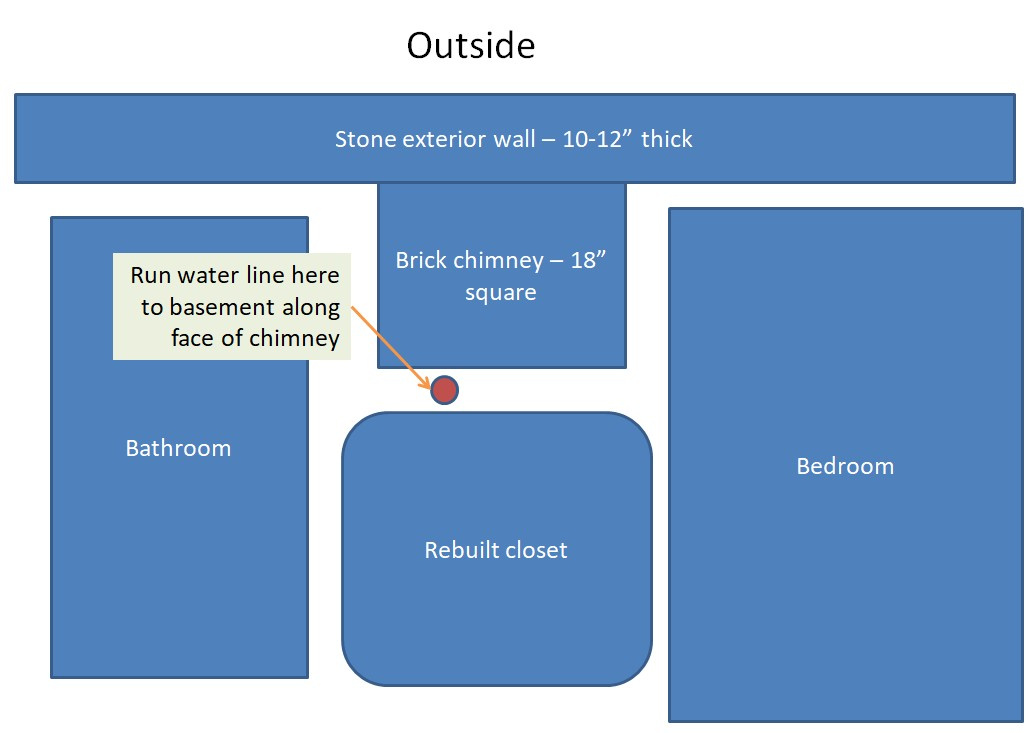Is this at risk of freezing?
I've been running a recirculating hot water loop using one of those crossover valves which uses the cold line for the return. I am in the process of rebuilding a third floor closet and realize I've got access to a space next to the chimney where I can probably fish a line of pex through to the basement to be a dedicated return line.
Only hesitation is I don't know how cold this space might get. it's a hot water recirculating line, but there's always power outages and other edge cases to consider. My gut tells me it's far enough from the exterior wall not to be a freeze risk (as long as the house heat is working!), but I'm not 100% sure. I'm also realizing we have some existing water lines running from basement to second floor in essentially the same spot two floors down and which have never been a problem, but I didn't put those in so never questioned them. House is a 1900 build without any insulation against the stone exterior.
Here's a top view cross-section of the space Dimensions are approximate. Would you put a water line here for a client? Region is Philadelphia area.
Comments
-
-
-
it essentially makes all of the hot water lines in the loop part of the tank
0 -
-
-
-
Use PEX tubing for the recirc line and insulate it well past the possible freezing point. If you wanted to take added protection, you could also run the insulated recirc pipe through a conduit, but long enough so the cold air can't penetrate through the ends. I live in an area where temps get well below zero and there is always a breeze. Also, remember that Hot water will freeze before cold water, so protecting it from a cool breeze should be taken.
0 -
I would recommend insulating a hot water return line regardless of location. That said can you access the area above that closet or chase so you can seal off any potential down draft? That would be helpful…
LANGAN'S PLUMBING & HEATING LLC
Considerate People, Considerate Service, Consider It Done!
732-751-1560
email: langansph@yahoo.com
www.langansplumbing.com0 -
I agree the line should be insulated. You should also know factory insulated PEX tubing is available for purchase and use. It is more costly than uninsulated PEX but the insulation will be on the tube as you install it. It's a one and done operation.
0 -
Isolation valves on both ends just in case.
0 -
Thanks guys. I had to give up on this one. Wasn’t nearly as easy to fish a line through two floors as I had thought it would be.
For real…hot freezing before cold?? I thought this was just some false myth I had heard back in my college days. Hows that work?
0 -
Your Zamboni will not make ice with cold water it needs hot water or you're gonna be swimming
0 -
-
"Hot Water freezes before cold" refers to the "Mpemba effect", and it's not proven science. There have been a lot of experiments and research around it, and it is only partially reproducible. Sometimes experimentation disproves this theory, so it's not a known quantity. In theory, there are a few requirements where it is true, but some of them don't apply to this situation, so I wouldn't say it's true in this instance.
One reason it may happen is that hot water evaporates more readily than cold, and evaporation causes rapid cooling, so you get a huge cooling boost from a lot of evaporation happening really quickly. But the hot water still has to travel through a cooler temperature before freezing, so it's questionable whether this really causes it to freeze faster. However, if you throw a bucket of hot water out into very cold air, you maximize its surface area, which allows for more evaporation, condensation, and crystallization, so you can make snow and ice faster with hot water here than cold water. But you won't really have evaporation inside your pex, so this won't really affect it.
Another theory is that hot water creates higher temperature differentials and temperature gradients between hot and cold, which allows more internal convection, which accelerates heat transfer. This actually could apply to your pipe.
Last one I'll mention is that heating water to or near its boiling point decreases gas solubility, so you lose dissolved gases from the water. Those dissolved gases slightly lower the freezing point, so your heated water might freeze at 32F, where your never-heated water might freeze at 31F or 31.5F. However, this mostly applies when comparing water that has been heated to water that has not been heated. If you're comparing water that has been heated to other water that has been heated, this shouldn't impact results.
There are a couple more theoretical drivers, but that's enough nerdy science rambling for today. The overall summary is that the statement "Hot water freezes faster than cold" should be taken as an unproven theory, not a law or a fact. It might be true, but it's not indisputably true.
0 -
-
please use the thread from a couple years ago with like 5 pages to further discuss…
0
Categories
- All Categories
- 87.5K THE MAIN WALL
- 3.3K A-C, Heat Pumps & Refrigeration
- 61 Biomass
- 430 Carbon Monoxide Awareness
- 122 Chimneys & Flues
- 2.1K Domestic Hot Water
- 5.9K Gas Heating
- 117 Geothermal
- 170 Indoor-Air Quality
- 3.8K Oil Heating
- 78 Pipe Deterioration
- 1K Plumbing
- 6.6K Radiant Heating
- 395 Solar
- 15.9K Strictly Steam
- 3.5K Thermostats and Controls
- 57 Water Quality
- 51 Industry Classes
- 51 Job Opportunities
- 18 Recall Announcements










